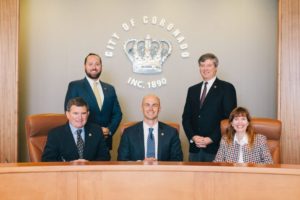
While winter storms washed away the drought, civic leaders are ever cognizant that the next drought is just around the corner. Most are taking steps to lessen the impact of the next one.
For its part, the Coronado City Council approved development of a recycled water treatment plant on the Municipal Golf Course at its meeting on Tuesday.
Instead of pumping Coronado’s sewage into the ocean the city will be able to treat the water locally and use it to water city’s green spaces, including the golf course, Spreckels Park and the Orange Avenue medians. The vote was 5-0.
The facility will have no visible impact, no odor or pose a threat to public health, Cliff Maurer, Director of Public Services and Engineering told the council. It will be built to the highest standards that “people in Coronado would expect,” Maurer said. Brezack & Associates, the firm the city hired to do the feasibility study, has worked in a “number of high-end communities,” he added.
The firm has built treatment plants in a number of upscale communities, including golf courses in the City of Pacific Grove and at Diablo Country Club. Pacific Grove is Coronado’s northern California twin. It has a similar demographic and the same water provider – California-American Water.
The facility will reduce our dependence on potable water and reduce costs of keeping the city green. Rates for potable water are expected to continue to rise and more and more cities in the region are turning to waste-water recycling to meet their needs. The project also has to pass muster with the planning commission and design review commission. Along the way there will be public meetings and a final review by the city council before construction can begin.
In other council news:
The council received an update on the Gateway Project, an effort to beautify the toll bridge plaza and calm traffic coming off the San Diego-Coronado Bridge. Plans call for removing the toll booths, redesigning traffic lanes, installing a rumble strip to A Avenue, and adding more landscaping. A pedestrian tunnel connecting both sides of Glorietta Blvd is also being considered. To ensure safety the tunnel would be lit and ADA compliant. The next phase of the project will involve creating signage and meeting environmental standards. To those ends, the council approved hiring a graphic artist to come up with ideas for lettering, and an environmental consulting firm. Hiring an artist and an environmental consultant is expected to cost no more than $60,000. Money will come front the Toll Bridge Fund.
Before any plan can be executed, it must first be approved by Caltrans. City Manager Blair King reminded the council that the city does not have jurisdiction over the bridge. Even if it were to seek relinquishment of that part of SR 75, the State of California will still own the bridge. As with the water-reclamation facility, the Gateway Project will be reviewed and revised by various commissions, the council and the public before ground is broken.
Responding to a barrage of criticism last year, the Coronado Tourism Improvement District (CTID) has revamped its marketing strategy. At the insistence of the city council last year, the CTID stopped local marketing and activities that could be interpreted as drawing local tourists or day trippers to the island. For example, it discontinued its ‘Uber to Coronado,’ a service that brought foodies to Coronado during restaurant week, and its Holiday Season Campaign, radio spots that urged people to shop in Coronado, and cancelled all of its social media accounts, including Facebook and Twitter. It even changed its name to Discover Coronado to emphasize its national focus, and crafted a new mission statement – “To enrich our community by positioning Coronado, and its resorts, as a premier meeting destination.”
In voting to accept the organization’s annual report and management plan, the council applauded the new direction. “This really addresses the concerns the residents have been raising and ones the previous council brought up. I applaud you for that,” Mayor Richard Bailey said. Funded by four hotels – Hotel del Coronado, Glorietta Bay Inn, Coronado Island Marriott, and Loews Coronado Bay Resort – the CTID receives no money from the city. The money comes from a .05% assessment on hotel guests.
“We are self sustaining,” said Todd Little, the group’s executive director. We bring visitors that “leave the least footprint.” While the CTID benefits the city’s four major hotels, the organization funds a number of projects that benefit residents and retailers, including the free summer shuttles and the village valet parking. The council voted 5 to 0 that it intended to continue the levy at the four hotels through the rest of the year. On May 16 it will hold a public hearing to ratify the levy.




